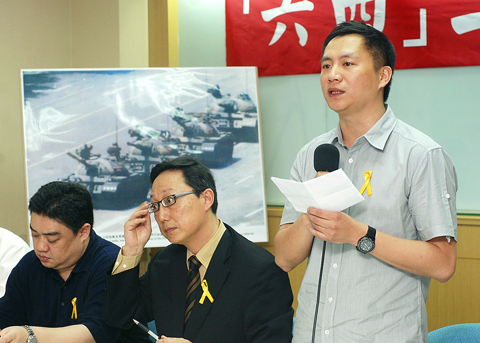As the Chinese Nationalist Party (KMT) government seeks to establish closer ties with China, it should not forget about the Tiananmen Square Massacre or withdraw its support for the democratic movement in China, Chinese democracy activists said yesterday.
“Under the Democratic Progressive Party [DPP] government, the Straits Exchange Foundation(SEF) — especially when Chen Ming-tong (陳明通) was its head — paid a lot of attention to issues concerning human rights, democracy and freedom in China,” said exiled Chinese democracy activist Wang Dan (王丹), one of the student leaders in the 1989 Tiananmen Square demonstration. “However, the MAC hasn’t touched on the issues since Lai Shin-yuan (賴幸媛) took over.”
The KMT used to give substantial support to China’s democratic movement before it lost power to the DPP in 2000, Wang said.

PHOTO: CHIANG YING-YING, AP
“I understand that the current government wants to focus on developing closer economic ties with China, but I think the MAC should still pay attention to human rights conditions in China,” he said. “After all, cross-strait relations can only be stable after China becomes a democracy.”
He made the remark at a news conference in Taipei to announce a series of activities to commemorate the 20th anniversary of the Tiananmen Square Massacre on June 4.
Events will include an exhibition of videos and photos from the demonstration at the Taipei City Council next Sunday afternoon and a rally and a sit-in at Liberty Square in Taipei from 6:04pm on June 3 until 9pm on June 4.
“Economic development in China has put many people who previously condemned Beijing’s violent crackdown at Tiananmen Square in a difficult position, as they are forced to be friends with the repressors in exchange for economic interests,” said Wuer Kaixi (吾爾開希), another former Tiananmen Square student leader who now lives in Taiwan.
He cited Straits Exchange Foundation Deputy Secretary-General Pang Chien-kuo (龐建國) as an example.
Twenty years ago, Pang was one of the organizers of a rally in Taipei to support the demonstrators in Beijing during the crackdown.
“However, when I called [Pang] to invite him to next week’s events commemorating the tragedy, he said he would love to come, but had to decline, saying it would be inconvenient for him to do so because of his position,” Wuerkaixi said. “As a friend, I understand his concern, but I still feel sorry to hear that.”
“There should not be any ‘inconvenience’ for anyone to remember that unarmed students were bloodily repressed by an authoritarian regime,” he said.
Former New Party Legislator Yao Li-min (姚立民), who is helping organize the events in Taipei this year, said he had also sent an invitation to President Ma Ying-jeou (馬英九), who actively participated in events commemorating Tiananmen Square before becoming president.
“We haven’t heard back from the Presidential Office yet, but I hope he will come,” Yao said.
Also See: China blocks Hong Kong TV show on Tiananmen Square
Also See: Tiananmen Square revisited

An undersea cable to Penghu County has been severed, the Ministry of Digital Affairs said today, with a Chinese-funded ship suspected of being responsible. It comes just a month after a Chinese ship was suspected of severing an undersea cable north of Keelung Harbor. The National Communications and Cyber Security Center received a report at 3:03am today from Chunghwa Telecom that the No. 3 cable from Taiwan to Penghu was severed 14.7km off the coast of Tainan, the Ministry of Digital Affairs said. The Coast Guard Administration (CGA) upon receiving a report from Chunghwa Telecom began to monitor the Togolese-flagged Hong Tai (宏泰)

A cat named Mikan (蜜柑) has brought in revenue of more than NT$10 million (US$305,390) for the Kaohsiung MRT last year. Mikan, born on April 4, 2020, was a stray cat before being adopted by personnel of Kaohsiung MRT’s Ciaotou Sugar Refinery Station. Mikan was named after a Japanese term for mandarin orange due to his color and because he looks like an orange when curled up. He was named “station master” of Ciaotou Sugar Refinery Station in September 2020, and has since become famous. With Kaohsiung MRT’s branding, along with the release of a set of cultural and creative products, station master Mikan

Actor Lee Wei (李威) was released on bail on Monday after being named as a suspect in the death of a woman whose body was found in the meeting place of a Buddhist group in Taipei’s Daan District (大安) last year, prosecutors said. Lee, 44, was released on NT$300,000 (US$9,148) bail, while his wife, surnamed Chien (簡), was released on NT$150,000 bail after both were summoned to give statements regarding the woman’s death. The home of Lee, who has retreated from the entertainment business in the past few years, was also searched by prosecutors and police earlier on Monday. Lee was questioned three

RISING TOURISM: A survey showed that tourist visits increased by 35 percent last year, while newly created attractions contributed almost half of the growth Changhua County’s Lukang Old Street (鹿港老街) and its surrounding historical area clinched first place among Taiwan’s most successful tourist attractions last year, while no location in eastern Taiwan achieved a spot in the top 20 list, the Tourism Administration said. The listing was created by the Tourism Administration’s Forward-looking Tourism Policy Research office. Last year, the Lukang Old Street and its surrounding area had 17.3 million visitors, more than the 16 million visitors for the Wenhua Road Night Market (文化路夜市) in Chiayi City and 14.5 million visitors at Tainan’s Anping (安平) historical area, it said. The Taipei 101 skyscraper and its environs —